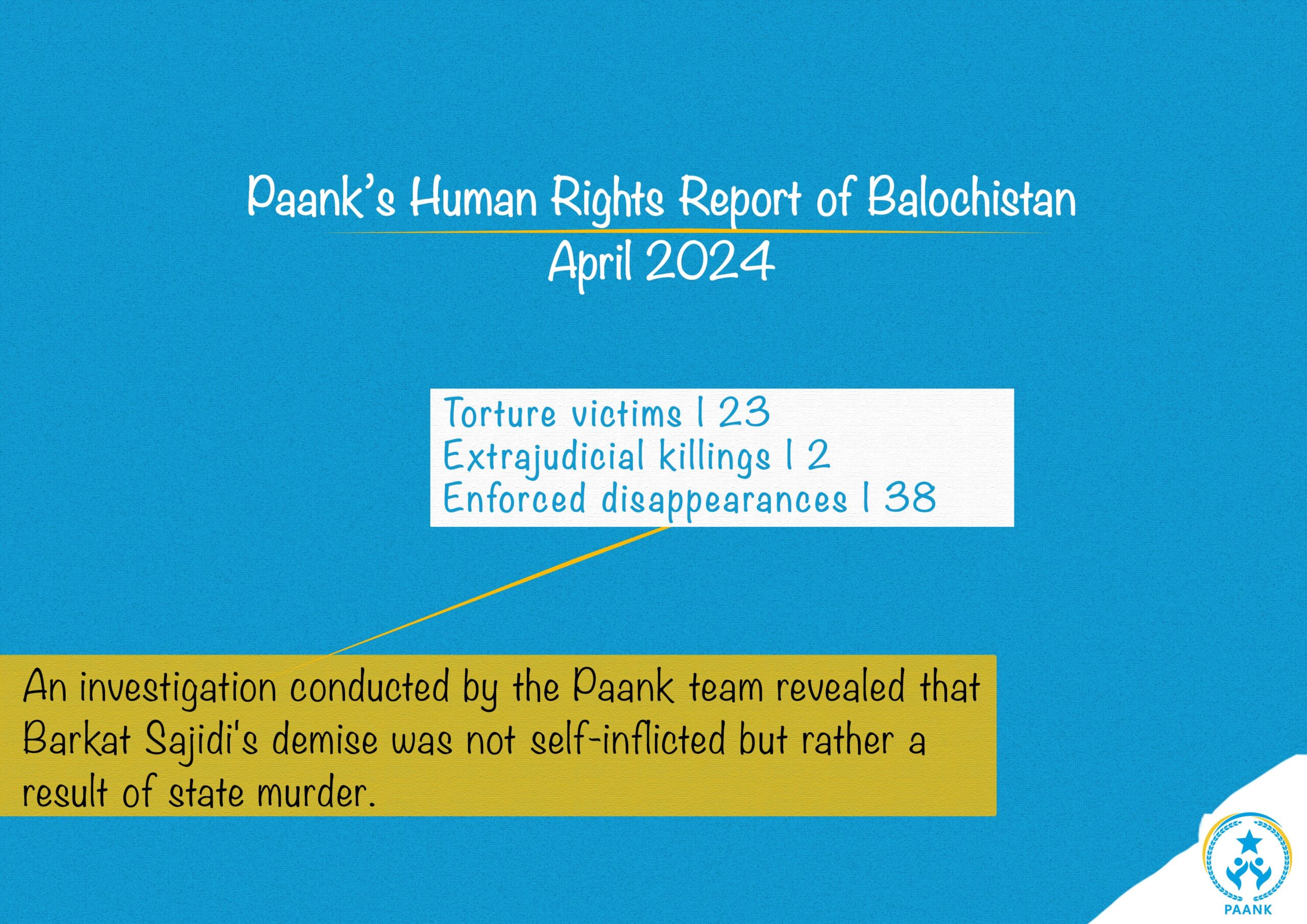This investigative report examines into critical human rights issues plaguing the region of Balochistan, focusing on enforced disappearances, extrajudicial killings, and the impact of the Gwadar fencing on citizen’s freedom of movement. Through rigorous data collection and field investigations, this report aims to shed light on the concerning trends and challenges faced by the Baloch people.
Statistical Analysis
Instances of enforced disappearances and extrajudicial killings have been documented across various districts of Balochistan, indicating a widespread violation of human rights. Detailed statistical analysis reveals the extent of these incidents, highlighting the urgent need for intervention and accountability.
Based on the findings of our data collection team and field investigations conducted across 10 districts of Balochistan in April 2024, it has been documented that 38 Baloch individuals were forcibly disappeared subsequent to extrajudicial detentions by agencies associated with the Pakistani forces, notably the Army.
In April 2024, numerous districts in Balochistan experienced a significant impact from enforced disappearances. The affected regions were as follows:
| District | Cases |
|---|---|
| Kech | 9 Cases |
| Gwadar | 4 Cases |
| Awaran | 12 Cases |
| Dera Bugti | 1 Case |
| Kohlu | 1 Case |
| Hub | 3 Cases |
| Khuzdar | 2 Cases |
| Shaal | 3 Cases |
| Kharan | 1 Case |
| Chagai | 2 Cases |
In April 2024, a total of 23 individuals, who had previously been subjected to forced disappearance, were released across 6 districts of Balochistan.
Malik Raba, son of Gul Muhammad Marri and a resident of Kohlu district, was detained by Pakistani forces at the Mache checkpoint on April 11. 2024. Regrettably, his lifeless body was found discarded in Sibi district 13 days later, indicating a tragic outcome following his enforced disappearance.
On April 14, 2024, Barkat Sajidi, an employee of the Levies Govt of Balochistan was extrajudicially killed. Authorities initially attempted to portray his death as a suicide. However, an investigation conducted by the Paank team revealed that Sajidi’s demise was not self-inflicted but rather a result of state murder. Paank released their investigative report on April 20, 2024.
Concerns Regarding Judicial Proceedings
The case of human rights advocate Rashid Baloch has raised significant concerns about the fairness and transparency of judicial proceedings. Renowned lawyer Iman Mazari has expressed dissatisfaction with the ongoing legal proceedings, highlighting consistent postponements and lack of progress.
Rashid Hussain Baloch, a human rights activist, was forcibly disappeared in the United Arab Emirates on 26 December 2018, following his refusal to comply with an unlawful arrest. The UAE government, in collaboration with Pakistani authority, facilitated his illegal detention.
Renowned lawyer Iman Mazari, overseeing the case of the enforced disappearance of prominent human rights activist Rashid Hussain Baloch, has voiced dissatisfaction with the ongoing legal proceedings. Mazari highlighted that the hearings for the Rashid Hussain case have been consistently postponed, raising concerns about the lack of progress.
Impact of Gwadar Fencing on Citizens: Freedom of Movement
The substantial presence of the Pakistani army in Baluchistan’s coastal regions has significantly disrupted the social fabric of the community. The proliferation of checkpoints, the appropriation of public land under the guise of security, and unwarranted interference by various agencies in the economic and social affairs of the populace have instilled a pervasive sense of fear, depriving citizens of their freedom.
The ongoing construction of a perimeter fence around Gwadar, purportedly to fortify the city, will exacerbate restrictions on citizen’s mobility. According to credible sources, extensive fencing from Gwadar Zero Point to the shores of Pishukan will not only restrict freedom but also sever a significant suburban area from the city.
The state-level approach towards Gwadar city not only widens the gap between the Baloch nation and the state but also impacts the entirety of Balochistan. The Pakistani establishment is promoting the notion that Gwadar is solely its territory, disregarding its historical ties to the Baloch nation.
This narrative, contrary to historical facts, drives initiatives such as constructing a perimeter fence around Gwadar and isolating it from Balochistan, along with the issuance of special entry and residency passes. Pakistan’s security agencies seek to deflect blame for their shortcomings onto the citizens.
The Gwadar fence initially faced public backlash, leading to a temporary halt in the project. However, construction resumed late last month despite continued opposition from citizens. In response to public dissent, state institutions are resorting to heavy-handed tactics to suppress opposition, including organizing fake rallies in support of the project.
As of the report’s drafting on April 4, 2024, citizens have reported instances where they were coerced into holding the Pakistan flag during what appeared to be a rally in support of the Gwadar fence. Such actions represent a blatant violation of human rights. Individuals should not be compelled to participate in activities against their will or without their consent.
Paank is concerned that the Gwadar fencing controversy could escalate into a new conflict in Balochistan, exacerbating the already dire human rights situation. We urge countries interested in investing in Gwadar to intervene on humanitarian grounds to prevent such a crisis from unfolding in the future.
Recommendations: Based on the findings of this report, the following recommendations are proposed:
- Urgent intervention by United Nations human rights organizations to address enforced disappearances and extrajudicial killings in Balochistan
- Advocacy for transparent and impartial judicial proceedings in cases involving human rights violations, including the case of Rashid Baloch
- Diplomatic efforts to mitigate the impact of the Gwadar fencing on citizens’ rights and livelihoods, prioritizing humanitarian considerations.
In conclusion, this investigative report underscores the pressing need for action to address human rights abuses in Balochistan and safeguard the rights and dignity of its people. By amplifying their voices and advocating for accountability, we can strive towards a more just and equitable future for all residents of Balochistan

